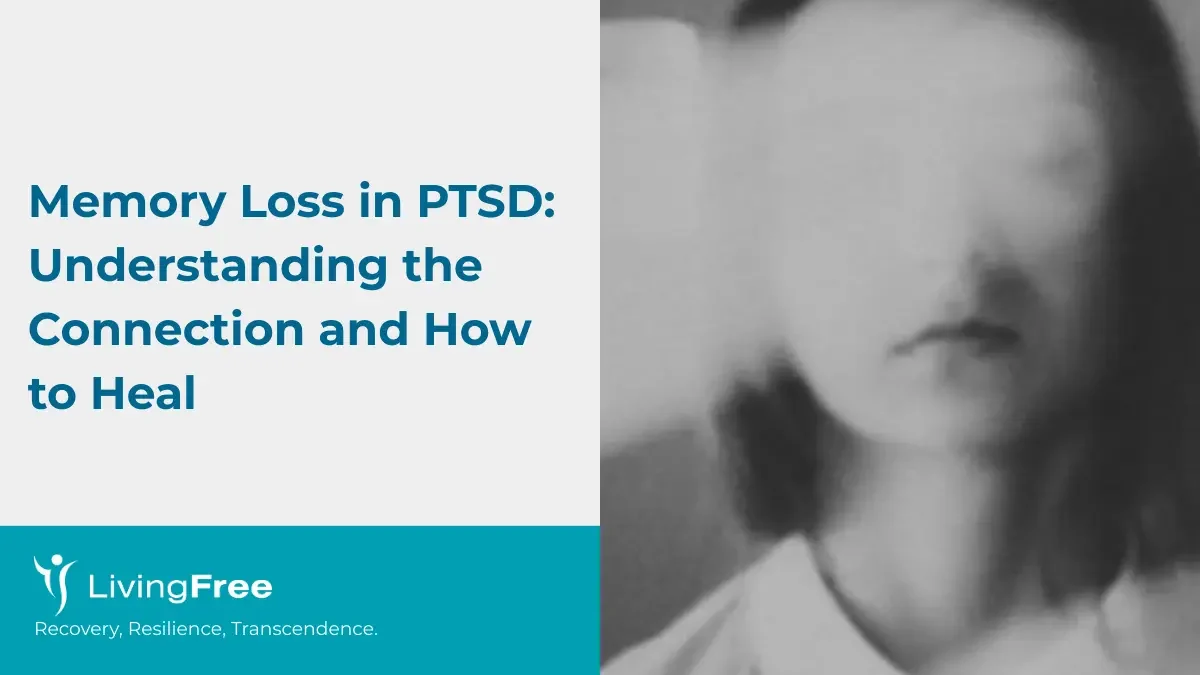Memory loss is one of the lesser-known yet deeply distressing symptoms of post-traumatic stress disorder (PTSD). Memory loss is a less recognized but highly distressing symptom of PTSD. It can impact both traumatic and everyday memories, causing confusion, frustration, and daily challenges. So why does trauma affect memory, and what steps can help?
This article breaks down the types of memory loss in PTSD, how trauma changes the brain, and evidence-based steps to improve memory function and quality of life.
Why Does PTSD Cause Memory Loss?
Can PTSD cause memory loss? Yes. But is it permanent? No. Trauma impacts how the brain stores, processes, and retrieves memories. When someone is exposed to overwhelming stress such as combat, abuse, or a natural disaster, the brain may respond protectively by altering memory function.
Key brain regions affected in PTSD:
- Hippocampus: Crucial for forming and retrieving memories; often shows reduced volume in PTSD.
- Amygdala: Processes emotional responses like fear, contributing to vivid emotional memories.
- Prefrontal Cortex: Governs decision-making and memory integration; may become dysregulated during trauma.
Chronic stress from PTSD leads to elevated cortisol and other stress hormones, which can impair the hippocampus over time. Disrupting how memories are encoded and retrieved.
Related Post: Understanding PTSD: Re-experiencing, Emotional Numbing, and Hyperarousal
Types of Memory Loss in PTSD
Memory disturbances in PTSD vary widely. Some affect the traumatic event directly, while others impact general daily memory. Understanding the different types of memory loss in PTSD can help survivors and their support networks recognize what’s happening.
1. Inability to Recall the Traumatic Event
Also called trauma-induced amnesia, this is the most direct form. Individuals may:
- Struggle to remember specific details or timelines
- Have fragmented, distorted, or “foggy” recall
- Experience flashbacks, but no cohesive memory narrative
This may stem from dissociation, a defense mechanism where the brain detaches from painful experiences.
2. Dissociative Amnesia
PTSD can trigger gaps in memory unrelated to trauma details. This form of amnesia may include:
- Forgetting important personal information
- Losing track of time or sequences
- Experiencing “blank spots” in daily memory, often without realizing it
Dissociative amnesia can be temporary or chronic and is more common in Complex PTSD (C-PTSD).
3. Everyday Memory Impairment
Many people with PTSD also report:
- Autobiographical memory loss (difficulty recalling life events)
- Working memory problems (trouble holding information briefly, like directions or phone numbers)
- Verbal declarative memory loss (forgetting facts, words, or spoken information)
These issues affect job performance, academics, relationships and often lead to self-doubt and increased anxiety.
Related Post: A Brief History of Psychological Trauma
The Impact of Memory Loss in PTSD
Memory dysfunction can deeply affect how someone with PTSD navigates life, like:
- Impaired daily functioning: Forgetting tasks, appointments, or routines.
- Relationship strain: Missing important conversations or dates can hurt trust and communication
- Increased anxiety: Worrying about memory failures may worsen PTSD symptoms or trigger panic
- Self-esteem issues: Memory loss can feel like “losing oneself,” contributing to shame and hopelessness
How to Handle Memory Loss from PTSD
Fortunately, memory loss in PTSD is often treatable through a combination of therapies, lifestyle changes, and coping tools.
1. Seek Trauma-Informed Therapy
Evidence-based therapies can help the brain reprocess traumatic memories and reduce related cognitive symptoms:
- Cognitive Behavioral Therapy (CBT): Helps reframe negative beliefs and improve memory-related anxiety
- Eye Movement Desensitization and Reprocessing (EMDR): Effective for trauma processing and reducing memory fragmentation
- Narrative Exposure Therapy: Helps reconstruct coherent trauma memories
For some, medication (like SSRIs or sleep aids) may also assist by reducing overall PTSD symptom load.
2. Engage in Memory-Boosting Activities
One way to support memory affected by PTSD is to engage in activities that strengthen the brain. Here are some small activities that can help improve focus, recall, and cognitive flexibility:
- Journaling: Keeps a daily record to support memory consolidation
- Brain games: Crossword puzzles, memory apps, or word games stimulate cognitive function
- Recall practice: Repeating conversations, rehearsing stories, and reviewing information helps strengthen pathways
3. Adopt Healthy Habits
Healthy habits can help your memory when dealing with PTSD. The activity suggestions are:
- Sleep: Crucial for memory consolidation; PTSD often disrupts REM sleep
- Exercise: Enhances brain plasticity and reduces cortisol levels
- Nutrition: Omega-3 fatty acids, antioxidants, and B vitamins support cognitive health
4. Use Memory Aids
External tools also reduce the stress of remembering everything mentally. Routinely, these tools may help:
- Digital calendars and reminders
- Sticky notes, task apps, and to-do lists
- Organized routines and visual cues at home
5. Build a Safe and Supportive Environment
Building a safe and supportive environment can boost memory and overall well-being. Feeling secure and supported reduces anxiety, helping you cope with memory challenges more effectively.
- Social support: Trusted friends or group therapy can ground a person in the present reality
- Mindfulness and grounding: Helps reduce anxiety-driven memory disruption
- Compassionate space: Feeling emotionally safe supports the brain’s healing process
Related Post: Psychological Trauma: Symptoms, Causes, and How to Heal
Is Memory Loss Permanent?
The answer is no. Most trauma-related memory impairments are reversible, especially with consistent treatment and support.
Healing doesn’t follow a straight path. Memory can improve at times and slip at others, which is completely normal and not a sign of failure.
In rare cases, particularly with Traumatic Brain Injury (TBI) or neurodegenerative conditions, memory issues may persist longer. A comprehensive evaluation can help rule these out.
When to Seek Immediate Help
It’s still normal to forget small things from time to time. That doesn’t automatically mean you have PTSD. Seek professional help if you or someone you love notices certain signs below affecting daily life, the earlier, the better.
- Sudden severe memory loss, confusion, or disorientation that affects daily functioning
- Inability to recognize familiar people or places
- Severe emotional distress, panic attacks, or thoughts of self-harm
- Difficulty managing basic tasks like eating, sleeping, or personal care
- Memory issues accompanied by suicidal thoughts or severe depression
Related Post: Can You Have PTSD Without Knowing It?
Final Thoughts
Memory loss in PTSD is real, disruptive, and often misunderstood. But it is also manageable and treatable. With the right support, therapy, and lifestyle tools, many individuals see improvement in both memory function and overall PTSD symptoms.
You are not broken. Your brain is protecting you, and healing is possible. If you’re struggling, don’t face it alone. Reach out for professional help or contact us today.


